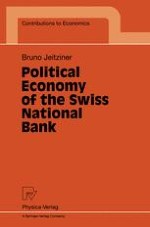1999 | OriginalPaper | Buchkapitel
Legislative Influence on Monetary Policy? The Case of Switzerland
verfasst von : PD Dr. Bruno Jeitziner
Erschienen in: Political Economy of the Swiss National Bank
Verlag: Physica-Verlag HD
Enthalten in: Professional Book Archive
Aktivieren Sie unsere intelligente Suche, um passende Fachinhalte oder Patente zu finden.
Wählen Sie Textabschnitte aus um mit Künstlicher Intelligenz passenden Patente zu finden. powered by
Markieren Sie Textabschnitte, um KI-gestützt weitere passende Inhalte zu finden. powered by
While executive influence on central banks is widely recognized, the legislature is usually not considered to be important in monetary policy, despite the fact that the central bank is a creation of the legislature and ultimately is accountable to it. The conventional wisdom is that legislators lack incentives to monitor and influence monetary policy. The view that government agencies operate independently of the legislature has been challenged by the theory of legislative control developed by Weingast. (Weingast/Moran 1983) Building on principal-agent models the theory of legislative control argues that principals are able to control their agents effectively. More recently, this theory has also been applied to the Federal Reserve. Grier (1991) and Havrilesky (1992) both report evidence for legislative influence by specialized legislative committees of the US legislature (the US Senate Banking Committee) on US monetary policy. But Beck (1990), who reworks an earlier version of Grier’s analysis, finds that data that cover a slightly different time period reject Grier’s results. The question of congressional influence on US monetary policy remains the subject of continuing debate.
